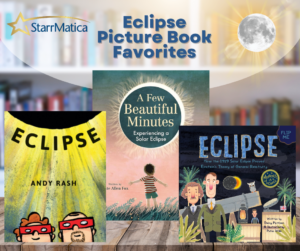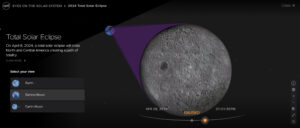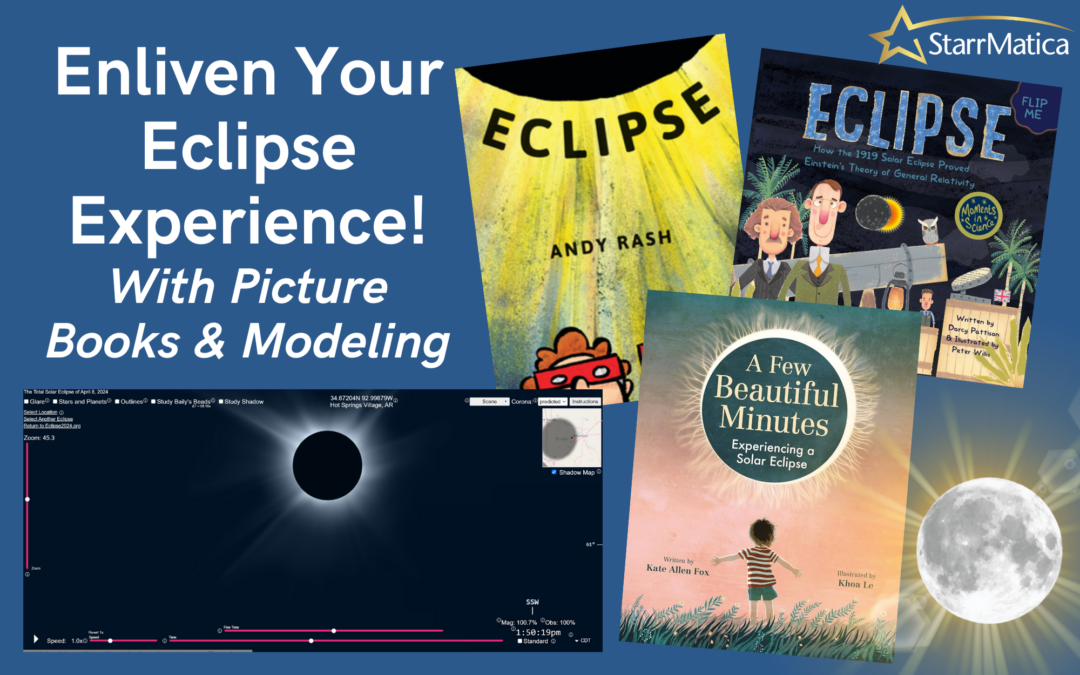Eclipse preparations are in full swing in my house! My family will be viewing the rare event from a boat in the middle of a lake in Hot Springs Village, Arkansas – a 12 hour drive from our home in Iowa. (Please cooperate, weather!!)
So what makes this eclipse worth the tiresome trek?
- Unlike the eclipse in October, this eclipse will achieve totality. There will be no “ring of fire” around the outside of the moon. The moon will completely cover the sun.
- The total eclipse is expected to last more than four minutes in some areas – that’s twice the amount of time to be awe-struck as the October eclipse.
- The next total eclipse will not occur until August 23, 2044!
Where Can I See the Eclipse?
If you are not in the path of totality and traveling isn’t in the cards, don’t worry! Everyone in the continental United States will experience some eclipse action. You can check out the percent coverage for your area via the image at the top of this post: https://www.wral.com/story/2024-total-eclipse-North-Carolina/21223237/
What Gear Do I Need to See the Eclipse?
When talking with your class about the eclipse, the first and most important conversation should be about safety. It is sooo tempting – especially for students – to take a quick peek at the sky, yet doing so can cause permanent damage. Eclipse viewing glasses are required to safely view any part of the eclipse directly – and be sure they are ISO Certified Safe. Regular sunglasses are not enough protection! I repeat: Regular sunglasses are not safe for eclipse viewing! You can read a bit more about the science behind the danger here: https://www.npr.org/sections/health-shots/2024/03/18/1238944697/get-ready-april-8-eclipse-glasses-eye-safety-damage-protection-doctors
Note: It is safe to remove your glasses if you are in the path of totality during the few brief minutes when the sun is completely covered.
Not able to grab eclipse viewing glasses? You can opt to build an eclipse viewer.
Here is a .pdf with directions for a pinhole viewer made with common household materials: https://www.colorado.edu/fiske/sites/default/files/attached-files/making-a-pinhole-viewer.pdf
How Can I Help My Students Learn About the Eclipse?
- Picture Books
Picture books are a fantastic way to introduce the concept of an eclipse and to help your students understand what to expect from the experience. Here are a few of my favorites:
experience. Here are a few of my favorites:
A Few Beautiful Minutes by Kate Allen Fox – Experience the awe and wonder of an eclipse in this lyrical tribute to the phenomenon.
Eclipse by Andy Rash – Follow the adventure of a boy as he plans an eclipse watching experience with his Dad.
Eclipse: How the 1919 Solar Eclipse Proved Einstein’s Theory of General Relativity by Darcy Pattison – Find out how the eclipse allows scientists to make new discoveries in a tiny window of time.
Totality!: An Eclipse Guide in Rhyme and Science by Jeffrey Bennett – Learn the science behind the eclipse in this fact-filled nonfiction book from an astrophysicist/educator.
Since these books are sure to be high in demand from your local library, you can find read aloud versions on YouTube or purchase your own personal copies – just be sure to order them now so they arrive before the big day!
- Modeling
Modeling is one of the best ways to help your students understand the science behind the eclipse.
Here is an eclipse modeling lesson plan from NASA: https://www.jpl.nasa.gov/edu/teach/activity/model-a-solar-eclipse/
And here is an interactive online model that allows you to view the eclipse from several unique perspectives:
https://eyes.nasa.gov/apps/solar-system/#/story/total_solar_eclipse
I saved the best for last. I am honestly a bit obsessed with this one! Check out this eclipse simulation that you can customize for your location! You can see the exact timing of the eclipse and what will be happening in the sky. Compare several locations with your students and discuss the differences they are experiencing and why different locations see the eclipse in unique ways.
https://eclipse2024.org/eclipse_cities/statemap.html
During modeling activities is a great time to focus your discussion on the crosscutting concepts. Here are a few questions to get you started:
- Is an eclipse a pattern? Why or why not?
- Why are people able to predict when an eclipse will occur?
- Why are system models important for understanding an eclipse?
- What is the cause of an eclipse, and what are its effects? What is the mechanism (or science) behind the eclipse?
- How does an eclipse affect the energy that flows into Earth?
Cloudy skies? Never fear, you can view the eclipse online with NASA: https://www.youtube.com/watch?v=2MJY_ptQW1o
Wherever you are located, and however you choose to celebrate, I hope you enjoy this once-in-a-lifetime event with people you love!

